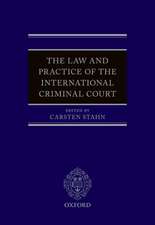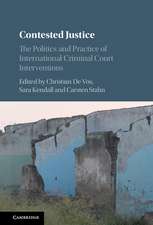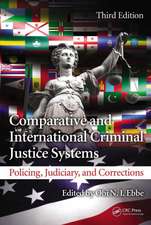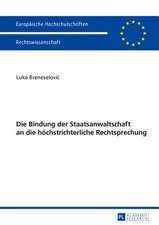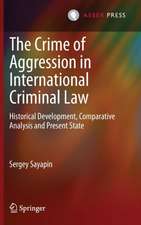Future Perspectives on International Criminal Justice
Editat de Carsten Stahn, Larissa van den Heriken Limba Engleză Hardback – 6 ian 2010
Then, it assesses the goals and scope of international criminal law, including contemporary developments relating to the interplay between international and domestic jurisdiction (e.g., verticality, complementarity, gravity), the role of actors (e.g., state crime, corporations, private military companies) and crime definitions (aggression, child recruitment).
This is followed by a review of key concepts of individual responsibility (e.g, joint criminal enterprise, co-perpetration, conspiracy) and procedural law (e.g., role of witnesses and victims, arrest).
Geared to academics, practitioners and NGOs
Preț: 1409.82 lei
Preț vechi: 1719.30 lei
-18% Nou
Puncte Express: 2115
Preț estimativ în valută:
269.77€ • 282.37$ • 224.53£
269.77€ • 282.37$ • 224.53£
Carte tipărită la comandă
Livrare economică 31 martie-14 aprilie
Preluare comenzi: 021 569.72.76
Specificații
ISBN-13: 9789067043090
ISBN-10: 9067043095
Pagini: 693
Ilustrații: 800 p.
Greutate: 1.27 kg
Ediția:1st Edition.
Editura: T.M.C. Asser Press
Colecția T.M.C. Asser Press
Locul publicării:The Hague, Germany
ISBN-10: 9067043095
Pagini: 693
Ilustrații: 800 p.
Greutate: 1.27 kg
Ediția:1st Edition.
Editura: T.M.C. Asser Press
Colecția T.M.C. Asser Press
Locul publicării:The Hague, Germany
Public țintă
ResearchDescriere
International criminal law is shaped by the influence of individual scholars and the impact of specific rulings and legal frameworks. This volume provides a fresh perspective on the subject, revisiting the sources, treatment and reception of doctrine and jurisprudence from an inter-generational perspective. Analysis of the role of scholars and practitioners such as Arendt, Damaška and Cassese on the conceptualisation of law and jurisprudence is followed by an assessment of the goals and scope of international criminal law, including contemporary developments relating to the interplay between international and domestic jurisdiction, the role of actors and crime definitions. Finally, the volume includes a review of key concepts of individual responsibility and procedural law.
Cuprins
The influence of scholars and practitioners on the development and conceptualization of international criminal law.- ’satires of Circumstance’: Some Notes on War Crimes Trials and Irony.- The Banality of Evil on Trial.- Why International Criminal Lawyers Should Read Mirjan Damaška.- The Gentle Humanizer of Humanitarian Law — Antonio Cassese and the Creation of the Customary Law of Non-International Armed Conflict.- The International Criminal Legal Process: Towards a Realistic Model of International Criminal Law in Action.- Theorizing international criminal justice.- The Two Liberalisms of International Criminal Law.- International Criminal Law at the Crossroads: From ad Hoc Imposition to a Treaty-Based Universal System.- In Search of the ‘Vertical’: Towards an Institutional Theory of International Criminal Justice’s Core.- Re-assessing the balance between international and domestic jurisdiction.- Situational Gravity Under the Rome Statute.- When Law ‘Expresses’ More Than it Cares to Admit: Comments on Heller.- Should the Prosecution of Ordinary Crimes in Domestic Jurisdictions Satisfy the Complementarity Principle?.- Interpreting Complementarity and Interests of Justice in the Presence of Restorative-Based Alternative Forms of Justice.- Universal Jurisdiction and the Prosecution of Excluded Asylum Seekers.- De-individualizing international criminal law: Can abstract entities commit international crimes after all?.- The Inter-American Court of Human Rights and Aggravated State Responsibility: Operationalizing the Concept of State Crime.- Corporations as Future Subjects of the International Criminal Court: An Exploration of the Counterarguments and Consequences.- Grey War Zone? The Question of Contractual Control of the Privatization of Warfare and Civilianization of the Military.- Holding Private Military Corporations Accountable for Their Crimes: The Applicability of the Command/Superior Responsibility Doctrine to Crimes of Pmcs.- Crime definitions revisited.- Defining the Crime of Aggression.- Complementarity and Aggression: A Ticking Time Bomb?.- The Recruitment and Use of Child Soldiers: Some Reflections on the Prosecution of a New War Crime.- System-criminality and the principle of personal fault: A balancing test in setting the appropriate standards for modes of liability.- The Difficulty with Individual Criminal Responsibility in International Criminal Law.- Current Trends on Modes of Liability for Genocide, Crimes Against Humanity and War Crimes.- From ‘Conspiracy’ to ‘Joint Criminal Enterprise’: In Search of the Organizational Parameter.- Towards one international criminal procedure?.- Trends in the Development of a Unified Law of International Criminal Procedure.- Witness Memory and the Manufacture of Evidence at the International Criminal Tribunals.- Remedies for War Victims.- Victim Partication in ICC Proceedings.- Arrest and Surrender Under the ICC Statute: A Contextual Reading.
Textul de pe ultima copertă
International criminal law is shaped by the influence of individual scholars and the impact of specific rulings and legal frameworks. This volume provides a fresh perspective on the table of contents of international criminal law. It revisits the sources, treatment and reception of doctrine and jurisprudence from an inter-generational perspective. It analyses the role of scholars and practitioners (e.g, Arendt,Damaška, Cassese) on the conceptualisation of law and jurisprudence.
Then, it assesses the goals and scope of international criminal law, including contemporary developments relating to the interplay between international and domestic jurisdiction (e.g., verticality, complementarity, gravity), the role of actors (e.g., state crime, corporations, private military companies) and crime definitions (aggression, child recruitment).
This is followed by a review of key concepts of individual responsibility (e.g, joint criminal enterprise, co-perpetration, conspiracy) and procedural law (e.g., role of witnesses and victims, arrest).
Geared to academics, practitioners and NGOs
Then, it assesses the goals and scope of international criminal law, including contemporary developments relating to the interplay between international and domestic jurisdiction (e.g., verticality, complementarity, gravity), the role of actors (e.g., state crime, corporations, private military companies) and crime definitions (aggression, child recruitment).
This is followed by a review of key concepts of individual responsibility (e.g, joint criminal enterprise, co-perpetration, conspiracy) and procedural law (e.g., role of witnesses and victims, arrest).
Geared to academics, practitioners and NGOs

